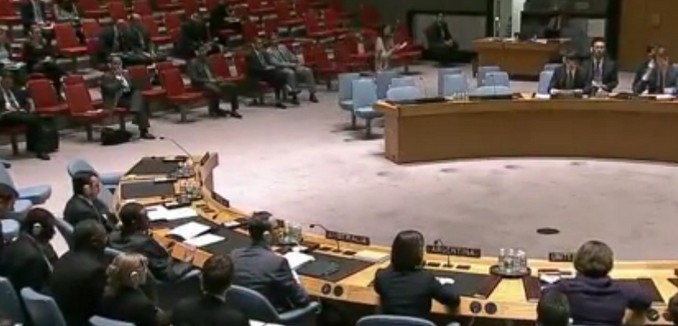If United Nations Security Council sanctions against Iran are removed as part of a deal over the Islamic Republic’s nuclear program, it could lead to a situation where Iran would have the “‘high ground’ as a victim of American lawlessness in future confrontations over its nuclear ambitions,” according to an analysis written yesterday by former Department of Justice lawyers David Rivkin and Lee Casey for The National Interest.
Rivkin and Casey write that “the Security Council-centric approach, while solving some of the Administration’s political problems, would impose very significant long-term costs on the United States, and would not ultimately achieve a binding deal that cannot be altered.” They then list four significant flaws to this approach.
The first problem is that, despite Secretary of State John Kerry’s claim that the deal would be non-binding and thus did not require Congressional approval, lifting sanctions through the Security Council “would bind the United States as a UN member.” The second problem with the Security Council approach means that any future imposition of sanctions would have to be done through a new Secuirty Council resolution. A related issue cited by Rivkin and Casey is that any determination of an Iranian violation would be made by the Security Council itself. The fourth flaw with the Security Council scheme is that the administration could use it to try to lift Congressionally mandated sanctions. While Rivkin and Casey maintain that such an approach would be “legally flawed,” they express concern that “it might give the administration some political cover to lift sanctions against Iran.”
The administration claims that the advantage of an executive agreement would give it the ability to “snap back” sanctions in place if Iran would be found to be cheating in the future. Giving the Security Council authority to determine if Iran is cheating would tie the administration’s hands because it would be difficult for the United States to block Security Council mandated sanctions relief unilaterally.
Rivkin and Casey explain why the Security Council route may be tempting to the administration:
Overall, it is understandable why by-passing Congress and going directly to the Security Council has appeal to the president and his advisors, who are desperately looking for something that can be portrayed as foreign policy achievement and appreciate the depth and breadth of congressional opposition to any agreement permitting Iran to retain its nuclear infrastructure.
But they warn that the approach would come with “tremendous diplomatic and national-security costs for the United States in the future.”
Because of the legal, diplomatic and Constitutional complications resulting from lifting sanctions on Iran through the Security Council, Rivkin and Casey advise the president to seek Senate approval of the deal:
In other words, if the administration does proceed to enshrine a nuclear-arms deal with Iran through the Security Council as a means of cutting Congress out of the process, it will not achieve its ultimate goal of a long-term agreement binding on the United States. It will merely impose additional and avoidable costs on the United States in the future when – as will almost certainly be the case – Iran again moves towards achieving nuclear power status. As a result, the administration should eschew this path and accept what the Constitution requires – Senate approval of the treaty it is now negotiating.
After Iranian Foreign Minister Mohammad Javad Zarif revealed that the Security Council would be involved in lifting sanctions on Iran, Sen. Bob Corker (R – Tenn.) wrote a letter to President Barack Obama warning him not to circumvent Congress in the course of making a deal with Iran.
[Photo: UN Tv / YouTube ]




